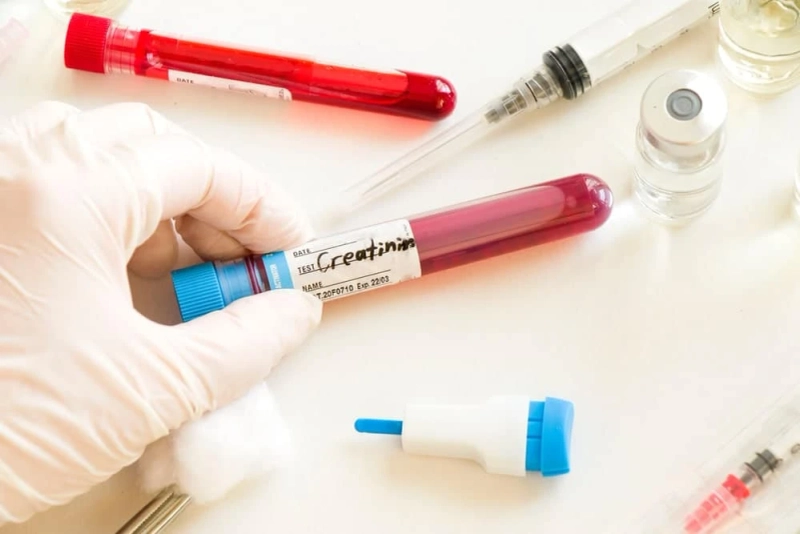The appropriate range of blood creatinine is maintained by healthy kidneys. Creatinine levels in the blood are a fairly good indicator of renal function. A high creatinine level in the blood suggests that your kidneys aren't working properly or that you have kidney disease. When the kidneys become compromised, the creatinine level rises, resulting in inadequate creatinine clearance by the kidneys. Renal function can be measured more precisely by calculating how much creatinine is eliminated from the body by the kidneys. The pace at which the kidneys filter waste is measured by creatinine clearance, also known as Glomerular filtration rate (GFR). There are two ways to calculate creatinine clearance. It's calculated using a method that takes the patient's weight, age, and blood creatinine level into account.
Creatinine clearance can also be determined by collecting a 24-hour urine sample and then extracting a blood sample. The concentrations of creatinine in the urine and blood are compared. Creatinine clearance in healthy women ranges from 88 to 128 mL/min, while it ranges from 97 to 137 mL/min in healthy men (normal levels may vary slightly between labs).
The level of blood urea nitrogen (BUN) is another indicator of renal function. Urea is a metabolic waste product that can build up if your kidneys are not working properly. The BUN-to-creatinine ratio, when compared to the creatinine level alone, provides more precise information on renal function and its likely underlying cause. BUN rises as a result of dehydration.
You may have symptoms such as dry or itchy skin, a high creatinine level, a loss of appetite, weakness, and vomiting if your kidneys are unable to perform the above-mentioned functions. This blog looks at the health issues that come with high creatinine levels, the kind of creatinine that requires dialysis.
Ayurveda kidney treatment is a too old procedure in Ayurveda of medicine, and Ayurvedic medicine for creatinine problem can be quite beneficial and successful.
What are the acceptable levels of creatinine in the bloodstream?
Adult males should have 0.6 to 1.2 milligrams per deciliter (mg/dL) of creatinine in their blood, whereas adult females should have 0.5 to 1.1 milligrams per deciliter (dL).
What does it mean to have a high creatinine level?
For an individual with a single kidney, a normal level is between 1.8 and 1.9.Creatinine levels of 2.0 or higher in infants and 5.0 or higher in adults may suggest serious kidney disease.A variety of parameters, including the BUN, creatinine level, potassium level, and the amount of fluid retained by the patient, indicate the need for a dialysis machine to remove wastes from the blood.What are the symptoms and indicators of a high creatinine level?
Kidney dysfunction manifests itself in a variety of ways. They don't necessarily correspond to creatinine levels in the blood.
Some people with no symptoms may have severe renal disease and elevated creatinine as a result of routine blood tests.In others, numerous kidney failure symptoms, depending on the nature of the disease, may be present, such as:If you're thirsty.FatigueA state of inflammation (edema)The sensation of being out of breathUtter confusion, orA slew of other signs and symptoms, including as nausea, vomiting, and dry skin.What factors contribute to elevated (high) blood creatinine levels?
Any condition that affects kidney function is likely to cause a rise in creatinine levels in the blood. It's crucial to figure out whether your kidney disease is long-term or new. Elevations that have recently developed may be easier to treat and reverse.The following are the most common causes of long-term (chronic) kidney disease in adults:
High blood pressure, andDiabetes.High blood creatinine levels can also be caused by the following factors:
Certain medications, such as cimetidine, might induce abnormally high creatinine levels on occasion.Serum creatinine levels may temporarily rise after consuming a large amount of dietary meat; as a result, food can sometimes affect creatinine measurements.An increase in creatinine might be caused by kidney infections or an obstruction in the urinary tract.Who has a creatinine level in their blood that is too low or too high?
Blood creatinine levels in young or middle-aged persons may be greater than in the general population.Creatinine levels in the blood may be lower in the elderly than in the general population. Infants have normal quantities of 0.2 or more, depending on their muscular development.Patients with malnutrition, significant weight loss, and long-term diseases tend to lose muscle mass over time. As a result, their creatinine level could be lower than normal for their age.The Benefits of Ayurveda on Creatinine Levels-
If your kidneys are unable to fulfil the above-mentioned functions, you may have symptoms such as dry or itchy skin, a high creatinine level, a loss of appetite, weakness, and vomiting. Ayurveda can be highly helpful for patients who have health difficulties related to excessive creatinine levels, the kind of creatinine that necessitates dialysis. Ayurvedic kidney treatment is an old process in Ayurvedic medicine, and Ayurvedic medicine for creatinine problems can be very useful and effective.
0


